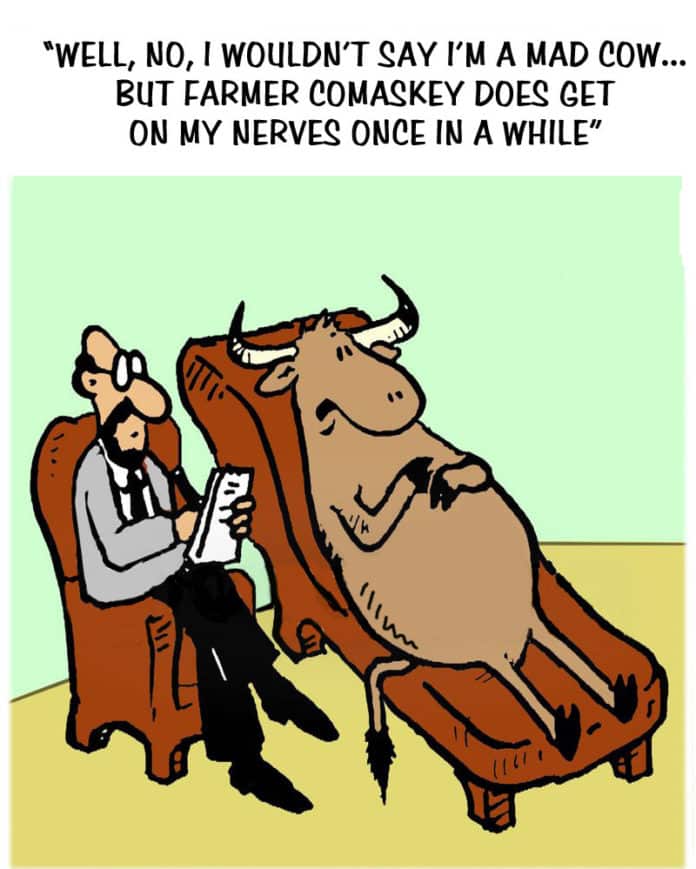If there is one thing that I’m not good at (Ah, OK Lads, so what if it could be more than one!) it is ‘giving the other fellow the right to be wrong.’ I try – but then I forget. Things that are not worth bothering about, such as bad driving on the road, a newsreader with hair covering one eye, a lying politician, or a dodgy call from a referee, can get my blood-pressure up out of all proportion to the offence.
Over the years I have worked on this defect of my makeup, but still, when someone does something to me, my response can often bypass the brain.
I know I am not alone here – apart from you, Job. We all need to take stock and only tog out for the battles that are worth fighting. Let the other stuff, ‘the small potatoes’, flow past you – or as the comedienne, Catherine Tate proclaims in one of her sketches, “I’m above it!” Too often, instead of being ‘above it’, I, for one, ‘lose it’.
Whenever any of us are 100 per cent in the right, it is very difficult to give the other fellow ‘the right to be wrong.’ But sometimes the cost of battle cannot justify proving you were right in the first place. If it is simply not worth it, well then you are better off just settling for the knowledge in your own heart that you are in the right.
Life isn’t measured in how many times you fight a good fight – just because you were right. On the contrary, it isn’t winning the battle that makes you happy, (apart from maybe that first short-lived surge of satisfaction) but how many times you looked the other way and decided you were ‘above it.’
Every confrontation drains our tank of time and energy. Even when you win that battle, maybe your time and expertise could have been better spent elsewhere? Not wasting your time is far more important than coming out on top in some minor skirmish.
Here is the important bit: Pick the battles that are worth fighting. No matter what the provocation, ask yourself what have you to gain by winning, after investing your precious time and energy. (Yes, I know, Lads …. I haven’t always taken my own advice!) Time lost is lost forever – and time is a limited resource. Ask yourself the question; what difference will it make in my life a year or two from now, whether I win or lose this argument?
We are not talking here about disputes that grow to the extent that they are settled in a court of law. But if you are unfortunate enough to be embroiled in any such case and are unable to side-step the steps of the court; you need to remember that what you get in a court of law, is law – and not necessarily justice.
Most of the things that ruffle us on a daily basis are small, petty irritations with no great importance to our lives in the long run. We would all do well to pause here and ask ourselves; ‘is this something I need to deal with, dwell upon, lose sleep over … or could my thinking-time be better spent elsewhere?’ One of the most common ‘wrongs’ is when we hear somebody was bad-mouthing us, or worse still, spreading malicious lies. This one is difficult to ignore, and more difficult to do anything about; so it is best to ignore and let the people make up their own minds.
If you have a justifiable grievance with somebody which needs to be resolved, try to come to an amicable conclusion if at all possible. Give the other person a bit of ‘wriggle-room’ with something like, ‘if I were you, I might feel that way too.’ This means nothing, but at least you have given him or her something out of it.
It isn’t easy to apply any of the above advice in an extreme situation where for example, somebody has a vendetta against you. As mentioned above, you cannot win the battle against a hate-filled deviant with no regard for the truth – so this is a battle not worth taking on.
The high moral ground isn’t always the safest road to travel, so we’ll drive home this point by repeating my favourite epitaph:
‘Here lies Michael Day: He died defending his right of way,
He was in the right, and his will was strong,
But he’s just as dead, as if he was wrong!’
So, let that be our lesson for today … choose your battles wisely!
Don’t Forget
Some people are so ingenious they can complicate simplicity.
















